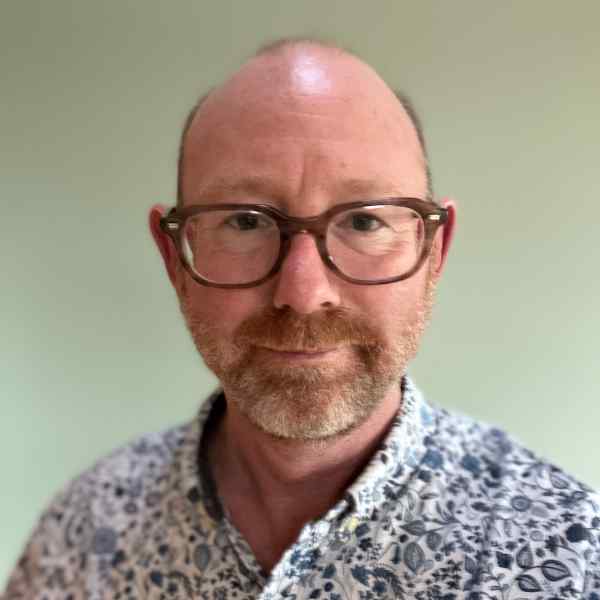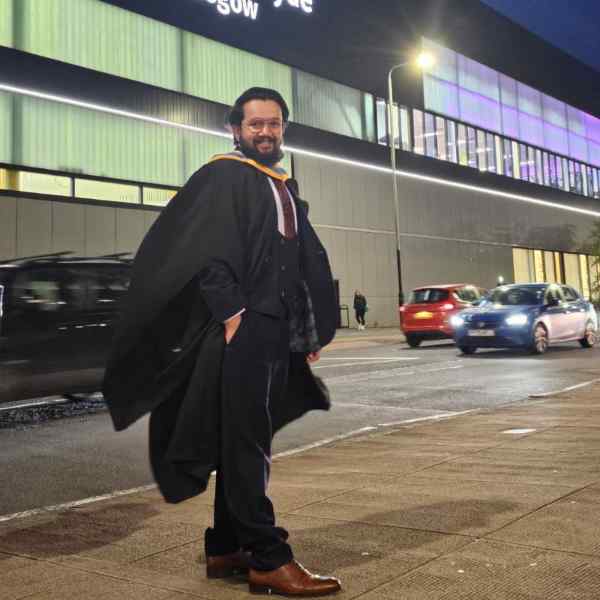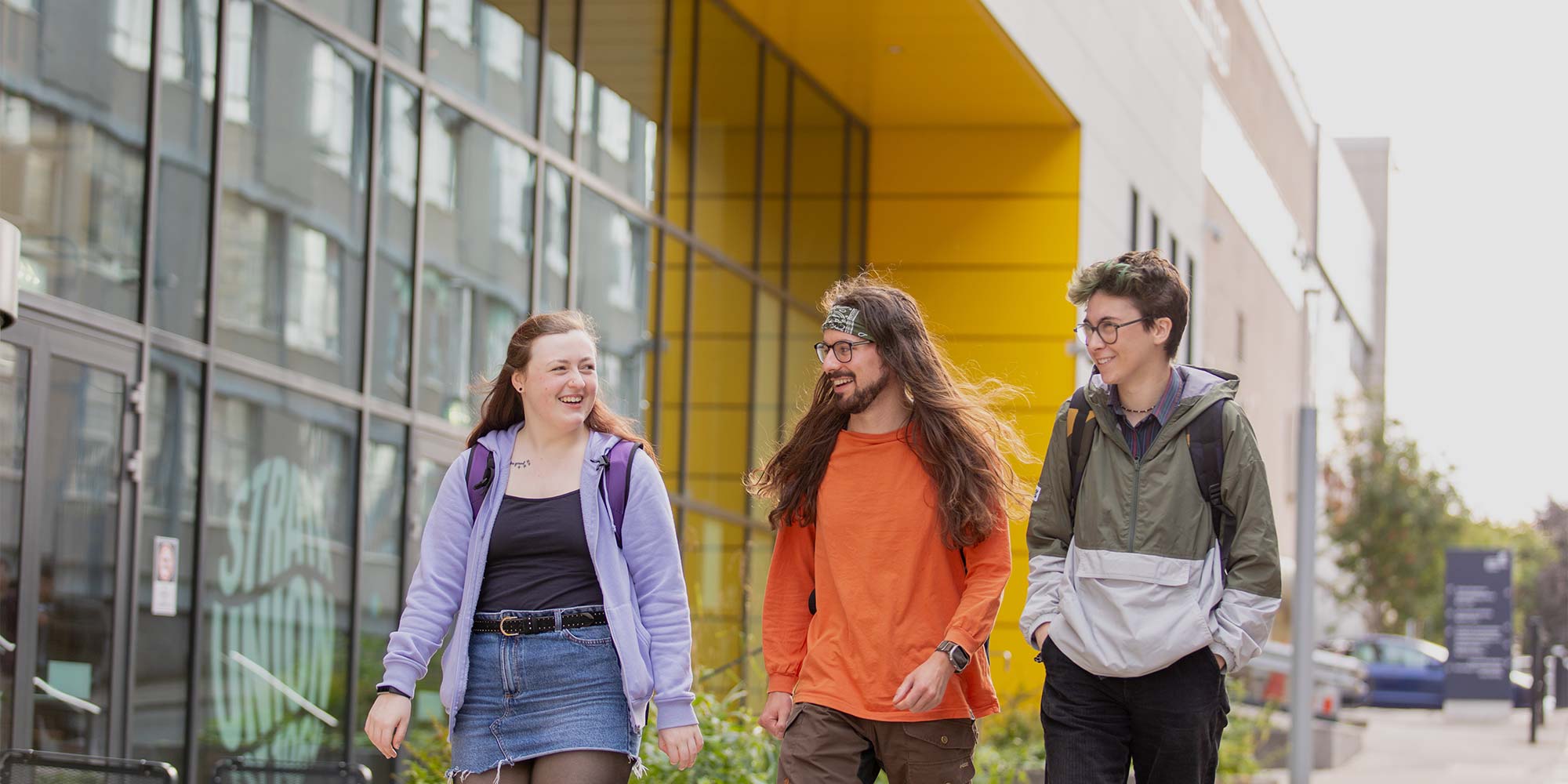MSc 5G Advanced Communications
ApplyKey facts
- Start date: September
- Accreditation: Institution of Engineering & Technology
- Study mode and duration: 12 months full-time
Industry Engagement: Competitive internships available
Study with us
This MSc will equip students with the skills and expertise for successful careers in the communications and information engineering sectors. You’ll:
- develop in-depth knowledge of the 5G mobile communications system (core, radio access network and management)
- gain an understanding of related wireless standards such as Internet of Things (IoT)
- develop an appreciation of both hardware and software aspects of 5G system implementation
- become familiar with wireless cyber security practices
- understand the relationship between 5G and evolving approaches to data analytics
- be prepared for leadership roles in research, development, and deployment of 5G systems
The Place of Useful Learning
UK University of the Year
Daily Mail University of the Year Awards 2026
Scottish University of the Year
The Sunday Times' Good University Guide 2026
Why this course?
This MSc is designed to meet the growing demand for graduates with the skills and expert knowledge needed to shape and drive the next generation of mobile, wireless, and communications technologies and systems.
Delivered by the Department of Electronic & Electrical Engineering, the course offers a rigorous blend of theoretical foundations and practical applications.
You’ll explore the practical, theoretical and technological aspects of 5G communications systems, covering topics such as:
- Mobile & Wireless Standards
- 5G Hardware Systems Design
- Software Defined Radio & Networking Systems
- Cybersecurity Systems
- Big Data & Information Management
- Advanced Digital Signal Processing & Multimedia Systems
The curriculum also examines broad-ranging applications, including:
- Robotics & Autonomous Systems
- Unmanned Aerial Vehicles (UAVs)
- Immersive & Augmented Reality Systems
- Health Monitoring Technologies
- Cyber-Integrated Systems
- Smart Grids
You'll investigate the challenges and opportunities presented by the data handling and integration of over 50 billion IoT devices, which are expected to come online to monitor traffic, weather, environmental conditions, agriculture, and smart appliances.
"The mobile communications industry continues to accelerate and evolve through 4G, 5G and beyond. As such demand for knowledge and expertise in wireless communications technologies is at an all-time high. This MSc offers a comprehensive learning experience, equipping students with technical expertise needed for next generation systems."
Dr Robert Atkinson
Course Director


What you’ll study
The MSc course is structured to provide both depth and flexibility. You'll study a selection of compulsory and optional taught modules focused on mobile, wireless, and 5G systems. These modules are designed to develop advanced technical expertise alongside the leadership, creative, and professional skills essential for success in the global communications and information engineering sector.
Teaching semesters:
- Autumn Semester - September to December
- Spring semester - January to May
Modules are delivered across these two semesters, combining lectures, hands-on labs, and project-based learning.
Check key dates for your MSc and the University academic session.
MSc Project
Students who pass all required taught modules will progress to the MSc Project, undertaken between May and August, and culminating with the Poster Presentation Day, where they will have the opportunity to showcase their research. MSc Projects involve an in-depth investigation on a topic chosen by the student within the field of electronic or electrical engineering. Projects may be:
- research-based, aligned with current departmental research themes
- industry-based, conducted as an unpaid internship with one of the department’s partner companies
While all projects are designed to address real-world engineering challenges, competitive internships offer additional benefits, including:
- site visits
- access to technical data & facilities
- mentorship from an industry professional
This course structure ensures that students graduate with not only academic knowledge but also practical experience and industry insight.
Poster Presentation Day
In the video below, MSc students talk about their studies and projects at the department's Poster Presentation Day:
Information Transmission & Security (20 credits)
The aim of this class is to develop an understanding of the principles by which information can transmitted with varying levels of security and the techniques by which communication systems can be analysed and designed.
Digital Signal Processing Principles (20 credits)
This class covers the fundamentals of discrete time convolution, correlation, transform methods, time frequency signal representation, downsampling/upsampling and digital filters that are core to state of the art machine learning and deep learning architectures. The class has an integral Matlab based laboratory set of tasks that students are required to undertake.
5G Communications Networks (20 credits)
The objective of this class is to provide an understanding of the principles and key transport technologies which underpin 5G communications networks and architectures while giving an insight to the technical and strategic challenges associated with the provision of a Quality of Service (QoS)-based integrated future-network platform.
Assignment & Professional Studies (20 credits)
The aim of this class is to provide you with support for your general academic and professional development.
You'll undertake an advanced investigation of an electronic or electrical engineering topic of your choice, to enhance your learning, and develop presentation and communication skills.
You’ll study at least 40 credits of optional modules. Please note that the below is an indicative list of modules, reflecting the curriculum in the current year. These modules are subject to change, but are likely to include:
Advanced Digital Signal Processing Principles (20 credits)
The objective of this class is to ensure you develop the necessary skills that will allow you to analyse, design, implement and simulate advanced DSP techniques and algorithms for a variety of communications and general engineering problems.
Image & Video Processing (20 credits)
This class will provide an introduction to the techniques relevant to digital images and video. This includes techniques both to process images and video and also to efficiently compress and communicate them.
The class will give you a comprehensive understanding of various image and video processing and coding standards. You'll also study some key applications of these standards.
Software Engineering (20 credits)
This class will introduce you to the software engineering process through the development and application of C++ programming skills. You'll become competent in specifying, designing and developing software and in writing and testing programs of moderate complexity.
Embedded Systems Design (20 credits)
This class provides hands-on experience in translating Digital Signal Processing concepts into real-time embedded systems applications.
Through a combination of lectures, up-to-date technical discussions and hardware programming, you'll learn to design and implement real-time embedded systems through familiarisation with Digital Signal Processors and FPGAs.
Students who successfully pass all required taught compulsory and optional modules will progress to the MSc Project.
MSc Project (60 credits)
The aim of the research project is to provide you with an opportunity to bring your knowledge and skills together and deploy them in a significant practical investigation, using relevant engineering literature, and where relevant, initial experiments or simulations.
Learning & teaching
The MSc is delivered through a blended learning approach, combining both in-person and online methods to provide a flexible and engaging educational experience. Teaching methods include:
- lectures (in-person & online)
- problem-solving tutorials
- hands-on, project-based laboratory sessions
This approach is designed to equip you with advanced technical expertise, while also developing essential leadership, project management, and professional engineering skills.
Each module typically includes:
- five hours of direct contact time per week
- at least five additional hours of independent study, supported by the University’s virtual learning environment, digital research resources, & library facilities
This structure encourages you to take an active role in your learning and to deepen your understanding through self-directed exploration and research.
Assessment
Each module employs a variety of assessment methods designed to maximise your learning and help you realise your full potential. These methods may include:
- coursework – involving research, design & analysis tasks
- examinations – testing core theoretical knowledge & problem-solving
- lab reports – documenting technical investigations
- presentations – developing the ability to communicate complex ideas clearly & professionally
- group projects – fostering collaboration & innovation skills
- final MSc Project – a substantive piece of independent work demonstrating mastery of a specialist area
Weighting of assessments
Taught modules account for two-thirds (120 credits) of the total assessment, while the MSc Project contributes the remaining one-third (60 credits).
The project is assessed based on the technical quality and contribution of an interim and final report, a poster presentation and demonstrated initiative, independent thinking and project management skills.
This diverse assessment structure ensures that you are not only tested on your academic knowledge, but also on your ability to apply it in real-world and professional contexts.
Professional development & employability
We are committed to helping you build a strong professional network and enhance your employability. In today’s competitive job market, having the right skills, training, and mindset is essential for career success.
To support your development, the MSc offers:
- access to cutting-edge facilities & state-of-the-art laboratories
- guidance from academic experts who are leaders in their fields
- opportunities for industry engagement through internships, guest seminars, careers events & networking sessions
These experiences are designed to help you develop not only technical expertise, but also the professional confidence and connections needed to thrive in the global communications sector.
Facilities
The department has extensive teaching spaces to support your learning and development, with state-of-the-art laboratories and specialist research centres dedicated to topics covered within the MSc. The centres collaborate with key industry partners within the communications sector, such as EE, Vodafone, Xilinx, Cisco, MathWorks, British Telecom, Intel, Lime Microsystems and Analog Devices.
Our laboratories, with their latest technologies spanning wireless and mobile radio hardware and software, FPGA and SDR systems, support your project work. These include our signal, image and vision processing laboratories, White Space Radio Testbed, and IoT Test Facility, meaning you can explore topics spanning security, dynamic spectrum, massive MIMO or with applications in smart agriculture, neural networks, satellite systems and driver-less cars.

Entry requirements
| Academic requirements | Normally a first-class or second-class honours degree (or international equivalent) in electronic, electrical or communications engineering, or a related physical sciences subject from a recognised academic institution. |
|---|---|
| English language requirements | If English is not your first language, please visit our English language requirements page for full details of the requirements in place before making your application. |
Pre-Masters preparation course
The Pre-Masters Programme is a preparation course held at the University of Strathclyde International Study Centre, for international students (non-UK/Ireland) who do not meet the academic entry requirements for a Masters degree at University of Strathclyde.
Upon successful completion, you'll be able to progress to this degree course at the University of Strathclyde.
Glasgow is Scotland's biggest & most cosmopolitan city
Our campus is based right in the very heart of Glasgow. We're in the city centre, next to the Merchant City, both of which are great locations for sightseeing, shopping and socialising alongside your studies.
Fees & funding
All fees quoted are for full-time courses and per academic year unless stated otherwise.
Please note: the fees shown are annual and may be subject to an increase each year. Find out more about fees.
Fees may be subject to updates to maintain accuracy. Tuition fees will be notified in your offer letter.
All fees are in £ sterling, unless otherwise stated, and may be subject to revision.
Annual revision of fees
Students on programmes of study of more than one year (or studying standalone modules) should be aware that the majority of fees will increase annually.
The University will take a range of factors into account, including, but not limited to, UK inflation, changes in delivery costs and changes in Scottish and/or UK Government funding. Changes in fees will be published on the University website in October each year for the following year of study and any annual increase will be capped at a maximum of 10% per year. This cap will apply to fees from 2026/27 onwards, which will not increase by more than 10% from the previous year for continuing students.
| Scotland | £12,550 |
|---|---|
| England, Wales & Northern Ireland | £12,550 |
| Republic of Ireland |
If you are an Irish citizen and have been ordinary resident in the Republic of Ireland for the three years prior to the relevant date, and will be coming to Scotland for Educational purposes only, you will meet the criteria of England, Wales & Northern Ireland fee status. For more information and advice on tuition fee status, you can visit the UKCISA - International student advice and guidance - Scotland: fee status webpage. Find out more about the University of Strathclyde's fee assessments process. |
| International | £32,800 |
| Additional costs | Course materials & costsAll students should expect to pay around £100 for additional course materials and other associated costs. You are not required to buy any specific software licences as all software used in classes will be available locally or remotely on campus machines. Some hardware (microcontrollers, design boards) may be available for loan purposes subject to a refundable deposit. If you choose to purchase these for project work, they cost approximately £10 to £30. Access to department computer labs out of normal working hours is via key card. This costs £20, but is refundable upon return of the card. You are provided with a printing quota for department lecture and tutorial notes, available for use in work conducted in department computer labs. You can buy top-ups if required through University IT Services. Some printing and report binding will be required as part of your course. This is provided by the department’s dedicated Resource Centre. Costs are likely to be about £10 to £20 per year, but will depend on the exact programme and classes taken. International studentsInternational students may have associated visa and immigration costs. Please see student visa guidance for more information. |
Scholarships available for September 2026
Faculty of Engineering International Scholarship for Masters Study
We are delighted to offer our Faculty of Engineering International Scholarship for Masters Study for applicants to postgraduate taught degrees starting in September 2026. The scholarship award of £6,000 will be deducted from tuition fees.
Dean's International Excellence Awards
We also have a limited number of Dean’s International Excellence Awards for postgraduate taught applicants joining the Faculty of Engineering in September 2026. These scholarships are worth between £9,000 and £12,000 and will be offered to exceptional applicants at postgraduate taught level only.
How can I fund my course?
Scottish postgraduate students
Scottish postgraduate students may be able to apply for support from the Student Awards Agency Scotland (SAAS). The support is in the form of a tuition fee loan and for eligible students, a living cost loan. Find out more about the support and how to apply.
Don’t forget to check our scholarship search for more help with fees and funding.
Students coming from England
Students ordinarily resident in England may be to apply for postgraduate support from Student Finance England. The support is a loan of up to £10,280 which can be used for both tuition fees and living costs. Find out more about the support and how to apply.
Don’t forget to check our scholarship search for more help with fees and funding.
Students coming from Wales
Students ordinarily resident in Wales may be to apply for postgraduate support from Student Finance Wales. The support is a loan of up to £10,280 which can be used for both tuition fees and living costs. Find out more about the support and how to apply.
Don’t forget to check our scholarship search for more help with fees and funding.
Students coming from Northern Ireland
Postgraduate students who are ordinarily resident in Northern Ireland may be able to apply for support from Student Finance Northern Ireland. The support is a tuition fee loan of up to £5,500. Find out more about the support and how to apply.
Don’t forget to check our scholarship search for more help with fees and funding.
International students
We've a large range of scholarships available to help you fund your studies. Check our scholarship search for more help with fees and funding.
Scholarships & funding support
Each year, we offer an extensive range of scholarships for new Home, UK, EU, and international students to help with tuition and living costs. These are offered at university and faculty level, as well as by our industry partners.
Careers
Communications impact virtually all areas of society, so graduates of this MSc are well positioned for a wide range of career opportunities in industry, business and academia.
Potential career paths include:
- 5G & Next-Generation Network Engineer – designing and optimising advanced wireless communication systems
- IoT Solutions Architect – developing integrated systems for smart cities, healthcare, manufacturing, and more.
- Cyber-Physical Systems Engineer – working on the interface between physical processes and digital control systems
- Spectrum & Network Policy Analyst – contributing to regulatory and strategic planning in telecommunications
- Data & Systems Integration Scientist – managing large-scale data flows and system interoperability
- Research Scientist or PhD Candidate – pursuing advanced research in wireless communications, signal processing, or information theory
Graduates have gone on to professional and technical roles with international companies such as Samsung, Xilinx, British Telecom, MathWorks, Nokia, and Texas Instruments, as well as with innovative local firms including Cirrus Logic, Leonardo, and Stream.
The globalisation of the communications sector and the widespread transition to 5G worldwide mean that this MSc serves as an ideal passport for graduates seeking international careers. Whether working in Europe, Asia, North America, or emerging markets, students will be equipped with the skills and knowledge to thrive in a globally connected industry.
What could I earn?*
| Role | Potential earnings |
|---|---|
| Systems Engineer | Entry level positions can start at £33,000, with average earnings in the UK increasing to £40,200. Once established, you can expect to earn up to £52,000 per year |
| Communications Manager | As a graduate starting out in your career, you can expect a salary of around £37,500, but this can rise to as much as £50,000 for more senior positions |
| Wireless Engineer | You could expect to earn an average of £50,000, rising to £70,000 per year for most senior positions |
| Data Scientist | Salaries for data scientists tend to start around £36,000. With a few years’ experience, you can expect to earn up to £47,000. Lead and chief data scientists can expect to earn upwards of £75,000 |
| IoT Architect | Typical UK graduate salaries start from £43,000 a year, with average annual salaries reaching £75.000. At senior or management level, this can increase to at least £85,000 depending on the type of company worked for |
Information is intended only as a guide. Salary detail acquired from Talent.com, June 2025.

Bridging theory and real-world applications, this MSc delivered academic excellence, engagement with industry pioneers and future-ready skills development in next-generation communications. Studying it was transformative for my career.
5G Consultant, Neutral Wireless Ltd.
Apply
To apply, click on the relevant apply button
As part of the admissions process, you must upload the following supporting documentation. We will be unable to process your application if these are not provided:
- official semester mark sheets/academic transcript showing subjects taken and grades achieved for all qualifications. If you're still studying, please provide your individual semester mark sheets to date
- certified degree certificate for all qualifications. If you're still studying, please provide this after completing your qualification
- evidence of suitable English language proficiency if English is not your first language, or you're not from a “UKVI recognised "Majority English Speaking" country”; check the University’s language requirements
- if you have been out of full-time education for over two years, provide a CV, detailing employment history, organisations worked for, and a brief description of roles and responsibilities demonstrating expertise, skills and suitability for the programme
- a copy of your passport containing your photo and passport number
- a copy of your sponsor letter/scholarship award (if appropriate)
- names, job titles and email addresses of two nominated referees
Start date: Sep 2026
5G Advanced Communications

